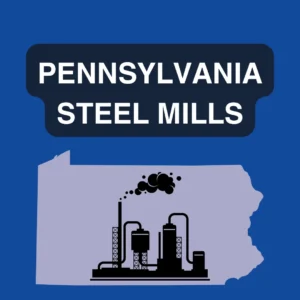The Use of Asbestos:
The extensive use of asbestos in steel mills, particularly those in Pennsylvania, posed significant health risks to workers. From the 1940s to the late 1970s, asbestos was a commonly used insulation material in steel mills, exposing employees to its toxic fibers during their daily tasks. Even today, workers in older buildings or using equipment from that era remain at risk, as many asbestos components have not been replaced with safer alternatives.

Workers Affected:
Various job roles within steel mills carried a high risk of asbestos exposure. Maintenance workers, machinists, pipefitters, and boiler workers were particularly vulnerable, as were welders, blacksmiths, bricklayers, millwrights, and motor inspectors. Regardless of their specific roles, steel mill workers were often exposed to asbestos while handling machinery, equipment, and materials involved in the steel manufacturing process. Even those not directly involved in steel manufacturing were at risk of asbestos exposure in steel mills due to the widespread use of asbestos-containing materials.
Asbestos Insulation:
Asbestos insulation found widespread use in numerous steel mill equipment and structures, primarily for its fire and burn resistance properties. Ovens, hot blast stoves, furnaces, rolling mills, tanks, boilers, cranes, molding boards, and steam pipes were among the many components that contained asbestos. Throughout the steel production process, workers would inhale asbestos fibers when operating machinery, feeding scrap metal into vessels using cranes, melting metal, and incorporating other metals to achieve the desired chemical composition. To protect themselves from extreme temperatures and burns while working with molten materials, steel mill workers often wore asbestos protective garments. However, these garments released asbestos fibers over time due to regular wear and tear.
In conclusion, the heavy use of asbestos in Pennsylvania’s steel mills during the mid-20th century exposed workers to significant health hazards. The risk of asbestos-related illnesses persists today for employees in older buildings or operating equipment from that era. It is crucial to raise awareness about the historical use of asbestos in steel mills and implement proper safety measures to protect workers from this toxic substance.
Here at the Halpern Law Firm, we are here for victims of mesothelioma. We want to make sure that all victims of mesothelioma get the compensation they deserve. If you have been diagnosed with mesothelioma and are interested in receiving compensation, call 800-505-6000 for a free case evaluation today. We are available 24/7.

Written By Jeff Nelson
Don’t Wait—Contact an Experienced Pennsylvania Mesothelioma Attorney Today!
Now that you know the mesothelioma statute of limitations in Pennsylvania, contact an experienced attorney from our firm to represent your case before time runs out.
At Halpern Law Firm, we help clients throughout Pennsylvania, with offices in Philadelphia, Pittsburgh, Allentown, Scranton and Johnstown. Call us today for a free consultation at (800) 505-6000.
